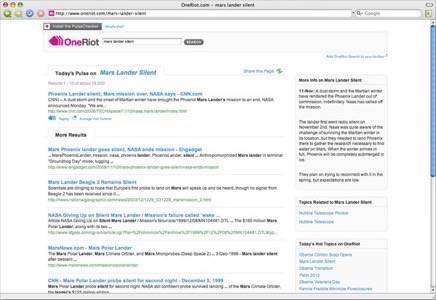What am I missing? And more importantly, what am I missing that other people are seeing? It’s those kinds of questions that drive millions of people to the Web – and to social news sites – on a daily basis. Because of that, any number of companies are racing to find ways to accurately answer those questions.

One of the companies was Me.dium, a browser add-in that provided real-time access to what others were surfing. Me.dium incorporated its technology into “social search,” releasing an alpha of its search engine earlier this year. Today, they’re relaunching that social search as OneRiot.
What makes OneRiot’s social search special? It uses feedback from real users – instead of robots – to drive relevance and ranking:
“Like other search engines, we keep a running record of the contents of the Internet. However, unlike other search engines, we prioritize that information based on its current popularity with our community. This makes OneRiot’s search results relevant, fresh, friendly, and pulsing with the real-time energy of the web.”
When OneRiot finds results that other users are currently visiting, it uses the data to provide an indicator of how important those results are: Emerging, Surging, or Raging.

How does OneRiot get the data? Users can opt to install a browser add-in that allows them to share their browsing data with OneRiot, much in the same way services like Alexa and Compete record usage. OneRiot claims to have more than 2 million users sharing their activity, today.

So What’s Hot?
Currently, political and entertainment topics sit atop the list of popular topics – for obvious reasons. But it’s not just the search results. The new OneRiot blog tends to focus more on the pop side of Web browsing, as well, featuring stories on Lindsay Lohan, psychics, and Palin’s chances for 2012.
Searches for topics like technology – even for topics like iPhone 2.2 and Android – result in the standard search result fare. Nothing geeky is really “pulsing” with the OneRiot crowd. The closest I could find? News on the Mars Rover.

Is This Solving a Problem?
Some would argue that another search engine is the last thing the Web needs. Especially a search engine that delivers more information on the latest pop princess.
When I read about the new direction for OneRiot, I felt exactly the same way I felt when – after a great deal of build-up – Like.com announced that they were going to become a shopping site. I was disappointed because, while the technology might be improving search, it wasn’t really improving my search experience.
OneRiot strikes a similar chord. I’m not disappointed in the technology per se. I’m disappointed that the current application doesn’t do much to solve my search woes. I’m sure there are a number of people who will find OneRiot valuable, but at this point, it’s not delivering much in terms of my interests.
It’s Still Early
There seems to be a whole new crop of contenders looking to improve search as we currently know it: Cuil, Delver, and OneRiot among them. And with the ever-growing glut of information at our fingertips, we could use the help.
Two recent innovations hold the promise to help us sift through information more effectively. One is the physical location from which we’re searching for information – the geolocation information – and the other is the people we trust to give us information – the social information.
For those pursuing the social aspect, the key to winning users is having peers that they trust using the service. Otherwise, the relevance is just as irrelevant as any other site. It’s a classic “chicken or the egg” problem. Relevant social content attracts users, but users are needed to determine relevant social content. And that is OneRiot’s challenge: finding enough users – with similar interests – to make the search results more compelling than the standard robot-driven search.
OneRiot still carries an “alpha” next to its name. It’s very early in its life, with room to grow and improve. As it grows, OneRiot has the potential to corner niche categories with specific markets and to increase its user base organically from there. But will OneRiot gather the critical mass required to make it a search contender with a wider audience? We’re still searching for the answer to that one.

















